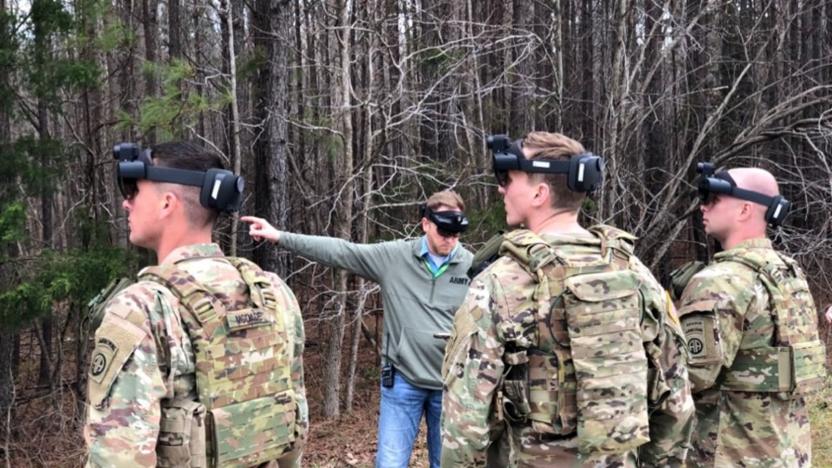military
Latest

US Navy's next-gen helicopter drone is ready for service
It took a few years, but the US Navy's beefier Fire Scout helicopter drone is finally ready for action... more or less. The military branch has declared that Northrop Grumman's MQ-8C has reached "initial operational capability," or the minimum state it needs to enter service. The new, Bell 407-based variant is considerably larger than its 8B predecessor, but it's also more capable. The 8C can last roughly twice as long in the air at 12 hours on station, and carry roughly three times the payload -- 701lbs, to be exact. It also packs new radar with a larger field of view and more modes, including air-to-air targeting.

Russia says it will give soldiers bomb-carrying drones
Never mind using small drones for battlefield recon -- if Russia has its way, they'll be another part of the arsenal. The country's Defense Ministry recently told Izvestia that it's not only outfitting platoons with small drones, but will eventually outfit these drones with weapons. There are already "miniature bombs" in development, the Ministry said. The move was apparently a response to experiences in Syria, where ISIS tried attacking a Russian base with commercial drones (such as the one pictured above) modified to carry explosives.

Germany and the Netherlands form a joint military network
Networking on the battlefield won't just be limited to communication between units for one country. Germany and the Netherlands have created a joint military network, TEN (Tactical Edge Networking), that helps soldiers from the two countries coordinate their operations. They'll even share computers, radios, telephones and other equipment. TEN will initially link Germany's land operations with the Netherlands' tactical communications program.

China's supercomputers are the latest target in US trade war
The US and China have been locked in a race for the world's most powerful supercomputer. China was in the lead with its Sunway TaihuLight, which has a 93 petaflop capacity. But the US surpassed that last year, when it released the Summit, which can run at 200 petaflops -- or 200 quadrillion calculations per second. Now, the US is using export restrictions in an attempt to thwart China's supercomputing efforts.

Colorado college students were secretly used to train facial recognition
Researchers used over 1,700 photos of students and others without their permission for a facial recognition study sponsored by US military and intelligence services, according to the Colorado Springs Independent and Financial Times. While technically legal, it has raised questions about privacy around facial recognition tech, especially considering how the photos might end up being used. "This is essentially normalizing peeping Tom culture," the Electronic Frontier Foundation's David Maas told CSIndy.

CIA 'Ninja bomb' replaces explosives with six long blades
The US apparently has a unique approach to minimizing bystander casualties from drone strikes: replace the warhead with old-fashioned knives. The Wall Street Journal has learned that both the CIA and the Pentagon have been using a variant of the Hellfire air-to-ground missile, the R9X (aka "Ninja bomb"), that deploys six blades moments before impact to cut through virtually anything in its path, including buildings and cars. The idea is to take out a terrorist leader or a similarly prominent target without risking the lives of nearby civilians.

Israel is the first to respond to a cyberattack with immediate force
It's no longer novel for militaries to respond to cyberattacks with physical force (the US used a drone strike in 2015), but now they're being treated with the same urgency as real-world bullets and missiles. Israel Defense Forces have launched an airstrike on a Gaza Strip building believed to house Hamas digital warfare operatives after the militant group reportedly failed in an attempted "cyber offensive." Details of the virtual attack weren't available, but the IDF said it was "ahead of them all the time."

US Air Force successfully shoots down multiple missiles with a laser
The US Air Force just edged closer to its goal of outfitting aircraft with laser weapons. Testers at the White Sands Missile Range have successfully shot down multiple air-launched missiles using the Self-Protect High Energy Laser Demonstrator (SHiELD), proving that it can hold up under intense situations. While SHiELD is currently a ground-based behemoth (see below), the finished technology should be portable and rugged enough to be used aboard aircraft.

Nikola's new zero-emissions vehicles include a jet ski and a dune buggy
Nikola isn't messing around when it comes to its vision of a zero-emission future -- at this year's Nikola World event in Arizona the company unveiled no less than five clean vehicles, including the much-anticipated fully electric semi-trucks, Nikola Two and Nikola Tre.

Three teams will compete for millions in DARPA's rocket launch challenge
Despite all of the advancements in space travel, rocket launches are still hindered by the fact that they take months, if not years, to plan and execute. Because that could slow vital military operations, DARPA created the Launch Challenge: a call for commercial companies to prove they can get rockets into space quickly and on short notice. Now the three finalists have been selected for the next phase of the challenge.

US Army shows how it will use HoloLens in the field
When Microsoft employees balked at the company's $479 million HoloLens contract with the US Army, it raised a question: just what would this system look like? You now have a better idea. The Army has given CNBC an early demo of its Integrated Visual Augmentation System, which uses a modified HoloLens 2 to provide both combat assistance and training. It reportedly feels like a "real-life game of Call of Duty" -- you can see your squad's positions on a map, a compass, and even your weapon's reticle. Thermal imaging would help you see in the dark without as much of a telltale glow as existing night vision headsets.

Palmer Luckey's firm wins Pentagon drone AI contract
Google may have backed out of the US military's Project Maven, but that doesn't mean other tech companies are unwilling to participate. The Intercept has learned that Oculus Rift co-founder Palmer Luckey's defense company, Anduril, won a contract to support the drone AI initiative in 2018. The firm will also support the Joint Artificial Intelligence Center, according to newly obtained documents. While there aren't specifics around what that contract would entail, Project Maven relies on machine learning to detect people in drone videos and provide more effective intelligence data.

US Army email mistake puts hundreds of immigrant recruits at risk
Accidental exposure of sensitive data is a major problem by just about anyone's standards, but it could be genuinely dangerous when the military is involved. The Washington Post has learned that the US Army inadvertently emailed sensitive recruitment data on more than 4,200 immigrants to recruits, including names, enlistment dates, languages and Social Security numbers. Over 900 of those in the mix are Mandarin speakers while dozens speak Russian, raising the potential for China and Russia to persecute the recruits or their families as punishment for becoming American soldiers.

Cyber Command put the kibosh on Russian trolls during the midterms
The US military has reportedly retaliated against Russian attempts to interfere in elections. Cyber Command took the notorious Internet Research Agency offline on 2018 midterm election day in November, officials told the Washington Post.

Microsoft chief defends controversial military HoloLens contract
Microsoft employees objecting to a US Army HoloLens contract aren't likely to get many concessions from their company's leadership. CEO Satya Nadella has defended the deal in a CNN interview, arguing that Microsoft made a "principled decision" not to deny technology to "institutions that we have elected in democracies to protect the freedoms we enjoy." The exec also asserted that Microsoft was "very transparent" when securing the contract and would "continue to have that dialogue" with staff.

Microsoft workers demand end to HoloLens contract with US Army
You can add Microsoft to the growing list of companies whose staff are objecting to the use of their technology for some military purposes. A group of Microsoft workers has published an open letter to CEO Satya Nadella and legal chief Brad Smith asking them to end a $479 million HoloLens contract with the US Army. They contended that Microsoft is effectively developing weapons by helping the Army create a platform that helps its soldiers train and fight using augmented reality. It not only helps kill people, but turns war "into a simulated 'video game'" that disconnects infantry from the "grim stakes" of combat, the workers argued.

Veterans can access their medical info through Apple's Health Records
Apple is expanding its Health Records feature in iOS to cover one of the larger groups in the US: namely, veterans. The company is partnering with the Department of Veterans Affairs to make servicemen and women's medical info available in one place on their iPhones, including known conditions, prescriptions and procedures. It's the record-sharing system "of its kind" at Veterans Affairs, Apple said.

Russia tested a hypersonic missile it claims will beat all defenses
Russia might have advanced the development of a hypersonic missile system. State-backed media reports that the Defense Ministry has successfully tested Avangard, which mates an ICBM with a glide vehicle that travels up to Mach 5. Officials say they launched the missile from the Orenburg area (near western Kazakhstan) and hit a target thousands of miles away at a test range in Kamchatka. Not surprisingly, the test was conducted on orders from President Putin.

Android apps used by troops in combat contained vulnerabilities
Two Android apps used by the US military in live combat situations contained severe vulnerabilities that could have allowed attackers to gain access to troops' information, a Navy Inspector General report revealed. The mobile apps offered real-time messaging to coordinate with other military branches, displayed mission objectives and goals, showed satellite images of surroundings and highlighted locations of nearby enemy and friendly forces.

Chinese hackers reportedly hit Navy contractors with multiple attacks
Chinese hackers have been targeting US Navy contractors, and were reportedly successful on several occasions over the last 18 months. The infiltrators stole information including missile plans and ship maintenance data, according to a Wall Street Journal report that cites officials and security experts.





